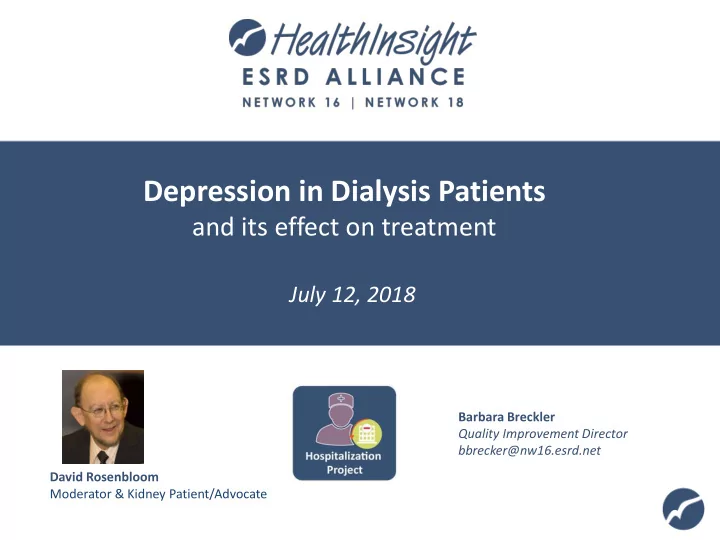

Depression in Dialysis Patients and its effect on treatment July 12, 2018 Barbara Breckler Quality Improvement Director bbrecker@nw16.esrd.net David Rosenbloom Moderator & Kidney Patient/Advocate
While all dialysis facilities are required to screen for depression, there are very few tools available to help patients move forward after the initial screening.
We in the KPAC (Kidney Patient Advisory Council of the National Forum of ESRD Networks) have developed an easy-to-use toolkit to help you help your patients overcome depression which accompanies dialysis. It is written by patients for patients in language they can easily understand and includes assessment tools and provides links to outside resources. These tools can help them overcome their anxieties and fear, and hopefully become healthier and happier people.
Table of Contents Chapter 1: The Emotional Demands of Dialysis Chapter 2: Signs of Anxiety and Depression Caused by Overwhelming Stress Chapter 3: Do I Need Help? Chapter 4: What Type of Help Is Out There? Chapter 5: Picking A Treatment Provider and How to Prepare for A Mental Health Visit Information for Professionals Patient Resources Acknowledgements ESRD Networks’ Patient Toll -Free Numbers/Map
Ch.1: The Emotional Demands of Dialysis The news that one’s kidneys have failed and that dialysis is required is most commonly received with fear , which is often expressed as either anger or depression.
We fear change, and dialysis is life-changing. • Health changes – a machine to keep us alive; loss of bodily functions • Family dynamics – no longer the bread winner • Financial changes – reduced income • Loss of energy – constant roller coaster ride of intense 3-day/wk. treatments
Life- changing fears continued… • Loss of our dreams – limited future, early death • Loss of control over our time • Loss of free time – never again being able to do the things we live for – travel, hobbies, good or favorite foods, sports • Loss of desire – low libido; failure as a lover
Ch.2: Signs of Depression • Excessive worry – anxiety, irrational fears, panic attacks, compulsive behavior • Self-consciousness – lack of self worth, guilt, despair, withdrawal, thoughts of suicide • Inability to sleep – muscle tension – chronic indigestion- inability to concentrate
Signs of depression continued… • Permanent damage to our hearts, vision and other effects of years on dialysis • Addiction to drugs, alcohol, smoking, etc. • Aggression – frequent mood swings, feeling that no one understands our predicament
Conclusions • Need for empathy – ability to place oneself mentally in the “patient’s chair.” • Need to recognize that dialysis is 20% physical and 80% mental. • Need to find out “What the patient wants beyond immediate survival.” • Need to help the patient find ways and resources to regain control over their lives.
Always remember… • A happy patient is a compliant patient, • And a compliant patient is most often back in control of his or her life. • Compliance is not passivity. It is actively taking responsibility for one’s health, and successfully combating depression.
The Dialysis Patient Depression Toolkit can be downloaded as a whole or chapter by chapter, a few pages at a time. Internet link: Dialysis Patient Depres#1CEBFB1
Recommend
More recommend